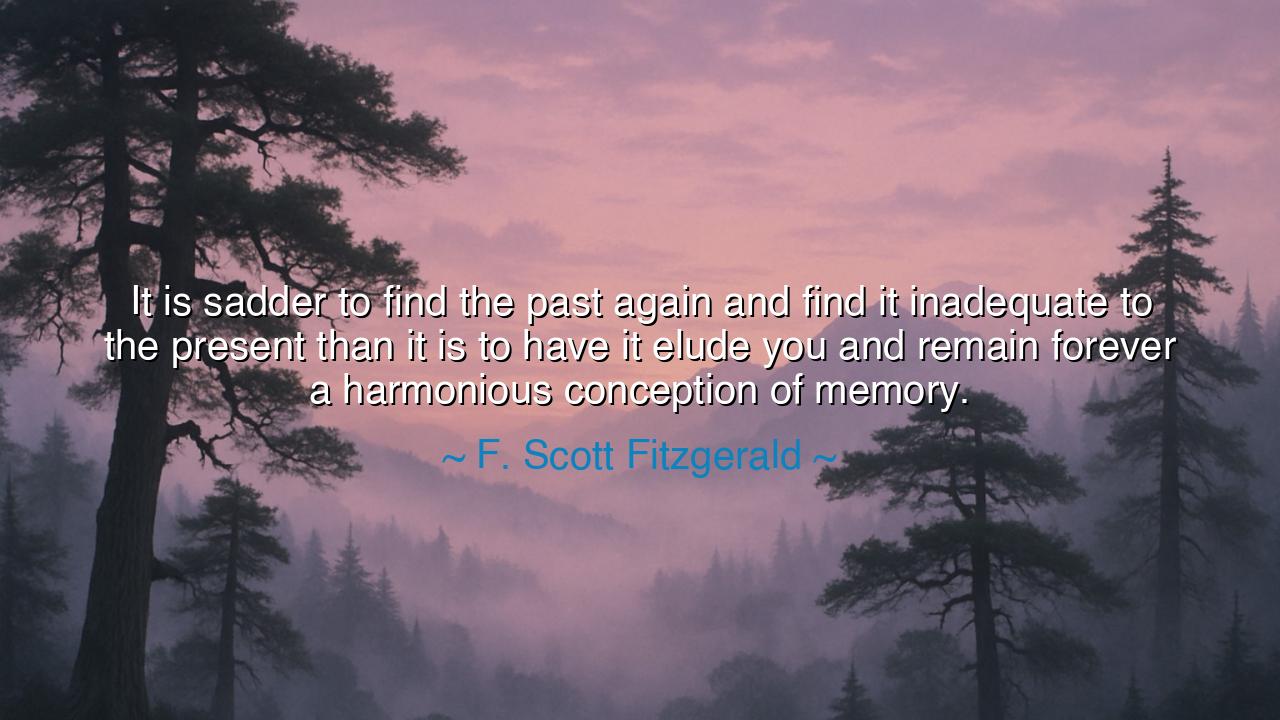
It is sadder to find the past again and find it inadequate to the
It is sadder to find the past again and find it inadequate to the present than it is to have it elude you and remain forever a harmonious conception of memory.






The words of F. Scott Fitzgerald, “It is sadder to find the past again and find it inadequate to the present than it is to have it elude you and remain forever a harmonious conception of memory,” whisper to us from the twilight of nostalgia. They speak of that deep ache in the human heart — the longing to return to what once was, only to find that time has altered both the thing and the soul that remembers it. In these words lies a truth known since the dawn of civilization: the past, once gone, should be cherished in remembrance, not pursued in vain hope of resurrection. For what time preserves in beauty, reality often mars when revisited.
The ancients understood this sorrow well. They called it the tragedy of the Lotus-Eaters, who tasted the flower of forgetfulness and lived in dream, forever content with illusion. Fitzgerald’s warning is of the same nature, though subtler — he does not praise forgetfulness, but cautions against disturbing the still waters of memory. For when one reaches back to the past, seeking to reclaim its sweetness, one may find instead that its colors have faded, its warmth turned cold, its harmony disrupted by the changes of the soul. Thus, it is often kinder to let the past rest as memory, shining like gold in the mind rather than dust in the hand.
Consider the story of Napoleon Bonaparte, who, after years of conquest and glory, was exiled to the barren island of Saint Helena. There, he would pace the rocky shores and recall the triumphs of Austerlitz, the cheers of armies, the thunder of empire. But when, in rare moments, echoes of the old world reached him — a uniform, a letter, a rumor of Paris — he found that it no longer fit the grandeur of his mind. The France he remembered had moved on, and the man he had been no longer existed. His past, once glorious, was inadequate to the present, and this, more than his defeat, broke his heart.
The wisdom of Fitzgerald’s words lies in this: memory preserves perfection, while reality reveals imperfection. The past, in its distance, becomes ideal — polished by time, softened by sentiment, stripped of pain. When we recall it, we recall not truth but the harmony our hearts have woven around it. Yet when we return to its places, its people, or its dreams, we find cracks where beauty once seemed seamless. The friend we adored is changed; the home we loved feels smaller; the song that once brought joy now feels hollow. The sadness of rediscovery is greater than the sorrow of loss, for it shatters the illusion that sustained us.
In this truth lies a lesson in acceptance and reverence. We must learn to honor the past not by reliving it, but by letting it stand untouched, like a sacred temple whose doors are closed. The ancients did not dwell forever among their ruins — they built anew beside them, allowing what was gone to remain holy in silence. Likewise, we too must learn to let memory be a lamp, not a leash — to let it guide, not bind. For those who dwell too long in yesterday risk becoming strangers to today.
There is power in remembering, but there is also danger in returning. To live well, one must love the past without being imprisoned by it. Cherish its lessons, hold its joys, but do not measure the present against its dream. The world changes, and so do we; and in that change lies the rhythm of life itself. Fitzgerald’s sorrow is thus also his wisdom — that time’s passage is both a wound and a healing, both a thief and a redeemer.
So, my child of the future, take this teaching to heart: do not chase the past, for it will not welcome you as you were, nor yield what it once gave. Instead, walk forward with gratitude, carrying the memory of what was as a quiet strength, not as a burden. Let your yesterdays be beautiful in recollection, but live today with open eyes and a fearless heart. For the past may fade, but the spirit that once lived within it — that courage, that love, that wonder — can be reborn in new forms, if only you dare to live again.
And thus, when the urge comes to reach backward, remember Fitzgerald’s wisdom: the past, left untouched, remains harmonious; the past reclaimed, too often breaks the heart. Let time guard your memories, and let your soul dwell in the present — for that is where life, in all its fullness, truly resides.






AAdministratorAdministrator
Welcome, honored guests. Please leave a comment, we will respond soon